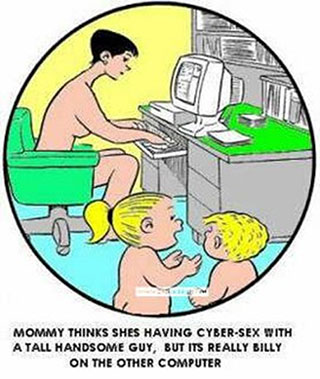Sex and the Singularity
Looking forward to next week's lesson on the "transhuman" world that many think will come with superintelligent AI in the near future, some think technology will eventually be harnassed in new ways that might actually bring humans back into intimacy with one another (and/or with the AI!) in ways we can only vaguely dream of now.
Here's futurist Ghisaine Boddington speaking in a 2015 TedX Vienna talk about the technology of physical intimacy:
The full talk is linked to in the sidebar references.

Extropia DaSilva was one of the futurists who responded to a 2009 question posed by h+ magazine, a periodical devoted to speculation about what technologically-enhanced humanity will be like in the future (again, see the final lesson for more on this). DaSilva imagines a future in which we live in a giant matrix of human consciousnesses supplemented and sustained by artificial intelligence. She imagines that the kind of "interpenetration" and intimacy such technology could provide would truly be a revolutionization of our current purely "sexual" possibilities:
A committed relationship would be to accept a complete merging of two selves. True love would be expressed by transferring the two uploads into a single, higher capacity "brain" (such as the sentient Internet itself) in which both minds run simultaneously. Such "twindividuals" might merge with others, resulting in an expanding hive-mind. Parts of the brain could be distributed over large distances, though if communication delays cannot be overcome that would impose a limit on how far the society of selves can expand and still be ALL=ONE. (DaSilva et al. 2009)
Most of the futurists writing on sex after "the technological singularity" (the point at which AI reaches human or greater than human intelligence), speculate about unfathomable new intimacies that will be created by the merging of humanity with artificial intelligence. Sex with robots will be a thing of the past, and gender, embodiedness, and most of what most of us consider important to our sex lives today may become irrelevant or tangential to the amazing "sex" - if it can still be called that - of the future.
Technology: Good, bad, or neutral for the evolution of sexuality and intimacy?
It seems possible that technology could in the short term invite more sexual alienation between partners, especially heterosex ones; but perhaps the technology of the more distant future will bring humans closer to one another in every sense than we have ever been, sexually or otherwise, in the history of our species.
Of course, there are those who would say that more intimacy is actually bad for sex - they point to the importance of uncertainty, fantasy, difference, power, passion, and perversity in sex, and to the ways in which some couples may get so much out of sex because they cannot be that close in other ways. Is it chilling or heartening to think that in the future technology might bring some way of connecting - bodily and spiritually - to other people that is "better than sex"?

This kind of fraud is what everyone seems to be worried about. But really as long as you're turned on by them what difference does it make who is on the other end really? (As long as it isn't a member of your family, of course! [Though clearly such fantasies are also out there in force now, at least on PornHub!])
What are the real down sides of taking "sex" online and turning it into a technologically mediated experience, as is happening more and more since the beginning of the pandemic?
When considering the negatives of the virtualization of sex, people often focus on "Fake ID" worries, the same things that worry most people about online socializing of other kinds: "catfishing," privacy concerns, blackmail, and hacking. Though these are valid worries, they stop short of the issues raised by the fact that "our tools shape us" even if we are using them honestly. The question for me is: will the technology change sex and intimacy for us in ways that are positive or negative (or some of each)?
Some hear about electronically mediated sex and are concerned that the birthrate will drop radically if a lot of us stop having sex directly. This seems an odd worry to me. First of all, it seems clear to me that there are too many human beings on the planet as it is; and the prevention of unintended pregnancies seems like another "plus" for sex mediated by technology. Secondly, for most people in Canada today, I would guess, "sex" is not mainly considered a reproductive act any more. On the contrary, we have gone from a world where any sex that wasn't for procreation was considered "perversion" to a world where it is sex for the purposes of baby-making that seems unusual, slightly laborious, and hard for some people to get into. Recreational sex is the norm now. By "sex," we rarely mean "mating," but rather the erotic coupling of two people showing love, power, desire, need, transgression, pleasure, and so forth.
I hope that apart from how you might personally benefit or suffer from these new technologies you will also consider the deeper implications of how our tools shape our humanity (how we treat each other, intimacy, our connection to or disconnection from each other, the power and other relationships, especially between people with different genders) when you are weighing up the positives and negatives of the virtualization of sex.